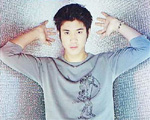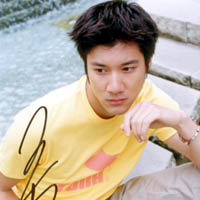

Lee Hom's " Forever 1st Day " Album Diary
89/07/01~89/07/07 @Part 4
Dear Friends,
For the past one month I've written regarding the album's
concepts and my thoughts etc. Today, I am also going to talk
about the the album, but in a more organized way. You may find
parts of this letter redundant with previous weeks, but I wanted
to have at least one week be a bit more comprehensive. This way,
you can get to know more about my album as a whole. In the
classical music world, it is standard practice for a composer to
write about his work, and to hold a pre-concert discussion before
its premier. I decided that this album, although pop music, would
benefit from such writings because of its density. Frankly
speaking, there are just too many musical events in this album
that go undetected and unappreciated in a casual listen.
Why make a dense pop album? My intent is to give my fans the
opportunity to enjoy a  deeper
level of listening/communication if they so choose. On the other
hand, if they just want to listen to my music while driving in
the car, or watching TV, they should feel free. In this letter, I
will walk through the entire album song by song, point out these
moments, and describe why they were arranged in this fashion.
deeper
level of listening/communication if they so choose. On the other
hand, if they just want to listen to my music while driving in
the car, or watching TV, they should feel free. In this letter, I
will walk through the entire album song by song, point out these
moments, and describe why they were arranged in this fashion.
Starting from track 1, "Introduction". This piece
illustrates the setting in which all of the album's songs were
composed, on the road. I mention many of Asia's cities, hotels,
and airplanes which continue to be my composing environment. I
spent a year composing and producing this album, and a year's
emotions are recorded like a diary in these songs. The background
of "Introduction" is a classical string quartet playing
to the chord changes of the album's last song, "You Can Tell
Me". Like an opera or a musical's overture, "Introduction"
hints at what is to come later in the album. "Forever's
First Day" is a song filled with surreal memories, and
consequently confused emotion. On the surface, it is a happy love
song about the reunification of two distant lovers. However, in
the context of this arrangement, it becomes apparent that the
sunshiny lyrics are surrounded by dark clouds. Our first clue to
the approaching turbulence comes right at the keyboard's intro,
two open fifth intervals spaced an augmented fifth apart
arpeggiate creating a texture of tension.
Following in the
tradition of Richard Wagner's use of "leitmotifs" in
his late 19th century operas, "Forever's First Day" has
an unabashedly dramatic arrangement. For example, in the second
line of verse 1, "I finally saw you there." we hear a
fleeting noise fly from left to right to left and disappear in
little more than a second. This is representative of the main
character's relationship with his distant love, always flying
from place to place and, like the noise, the transience of the
lovers' encounters always dissolve into memories in an instant.
When the main character sings, "You promised me, today you
would fly back home." (B section of the verse), the keyboard
plays a disturbing whole tone scale. Why should there be this
uncomfortable moment on a seemingly positive lyric? Questions
like this eventually make the listener wonder if the character's
love never came back at all.
After the bridge, we are led into the last set of choruses, where
we modulate suddenly and the whole song jumps up a minor third in
key. This moment is quite unlike the run-of-the-mill pop music
format, in which the final chorus may modulate half a step, or at
most a whole step. But I found that a minor third created the
feeling of intensity, perhaps even desperation on the part of the
singer needed to make this song uncommon. By the end of the
"Forever's First Day", we realize that what appeared to
have been a sunshiny love song perhaps is in fact a bittersweet
imagination of a deluded lover.
Of all the songs on this new album, I am most proud of "Descendants
of the Dragon". This is  not
purely from a musical standpoint, but rather also because this
song has a great message and great meaning. Popularized by my
uncle Li Jian Fu in 1980, it was the first Chinese song I heard
growing up as an ABC in New York. Now, in the year 2000, the year
of the dragon (which is also my zodiac year), I made a new
version with revised lyrics. The interesting fact is that 20
years after the song was originally performed, it now takes on a
brand new meaning. There are now Chinese people in every corner
of the world. The great message in "Descendants of the
Dragon" is, no matter where you were born or grew up, like
me in New York, or like the millions of others in Canada,
Australia, or L.A. we are all brothers and sisters, and are proud
of who we are.
not
purely from a musical standpoint, but rather also because this
song has a great message and great meaning. Popularized by my
uncle Li Jian Fu in 1980, it was the first Chinese song I heard
growing up as an ABC in New York. Now, in the year 2000, the year
of the dragon (which is also my zodiac year), I made a new
version with revised lyrics. The interesting fact is that 20
years after the song was originally performed, it now takes on a
brand new meaning. There are now Chinese people in every corner
of the world. The great message in "Descendants of the
Dragon" is, no matter where you were born or grew up, like
me in New York, or like the millions of others in Canada,
Australia, or L.A. we are all brothers and sisters, and are proud
of who we are.
Because of the simple melody and form of this song, I was able to
experiment and make huge changes in the new arrangement. Adding a
dance beat, jazz chords, live horns, and rap made this classic
song more contemporary. I also sung twenty-something tracks of
vocals and background vocals so I could sound like a strong
chorus of voices singing, "They are all the descendants of
the dragon!". I thought, "I need to make it sound big!"
To me, this song is about having a positive attitude towards the
future of Chinese people. The strength and the power of a billion
and a half lives was on my mind as I approached this song's
production.
I'll stop here for now. We'll continue the rest next week and I'll
also tell you what I've been up to recently.
Yours Truly,
Homeboy